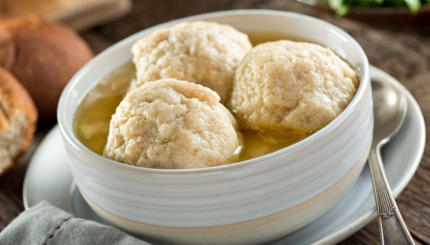Meat
Meat was restricted by dietary laws. “You may eat any animal that has a split hoof completely divided and that chews the cud” (Leviticus 11:3). The key word is “and,” for Leviticus 11 continues to describe the animals that have one or another attribute, but not both at the same time, e.g., the camel, coney, rabbit, and pig. Of them, it says, “You must not eat their meat or touch their carcasses” (Leviticus 11:4-8). This leaves the sheep, goat, ox, steer, and wild game, e.g., gazelle, deer, roebuck, wild goat, wild ox, and chamois. Even ritually fit animals, however, were subject to certain regulations and methods of preparation.
Meat was usually boiled, but was also roasted as prescribed for the paschal lamb at Passover, or cooked in a stew. At no time could a kid be boiled in its mother’s milk (Exodus 23:19; 34:26; Deuteronomy 14:21). The regulation was later extended to include the prohibition against even eating meat and milk products together at the same meal. Archaeology has proved it to have been a ban on a pagan practice. Findings at Ugarit [an ancient city whose ruins are located on the Syrian coast] have shown that it was the custom there to boil a kid in its mother’s milk as a lucky charm.
Fowl
Certain kinds of fowl were forbidden, including birds of prey (eagle, osprey, hawk, falcon, owl); those that feed on carrion (vulture, buzzard, raven); certain waterbirds (pelican, stork, heron, swan, sea gull); and other birds (ostrich, bat, lapwing). Poultry (goose, chicken, duck), pigeon and doves, and wild birds not on the above list were permitted (Leviticus 11:13-19; Deuteronomy 14:12-18). Only the eggs of clean fowl could be eaten.

Help us keep Jewish knowledge accessible to millions of people around the world.
Your donation to My Jewish Learning fuels endless journeys of Jewish discovery. With your help, My Jewish Learning can continue to provide nonstop opportunities for learning, connection and growth.
Fish
Fish could be eaten if it had fins and scales. This excluded all shellfish and fish that had fins but no scales, e.g., shark, catfish, and eels (Leviticus 11:9-12; Deuteronomy 14:9-10).
Insects and creeping things
Certain insects were acceptable as food, including the locust, katydid, cricket, and grasshopper. “All other flying insects that have four feet shall be an abomination to you” (Leviticus 11:20-24). Creeping things that crawl upon the earth are considered unclean, including worms, caterpillars, snakes, snails, lizards, chameleon, and moles (Leviticus 11:30,41-43).
According to Mosaic law, if any of the unclean creeping things dies and falls into a clay water pot, the water is to be considered unclean, and a source of contamination. The clay pot must be broken and if the carcass of a creeping thing touches the oven, it must be broken as well (Leviticus 11:33-35).
Excerpted from the entry “Food” in the Almanac of the Bible, edited by Geoffrey Wigoder, Shalom M. Paul, and Benedict T. Viviano, published by Prentice-Hall. Most of the distinctions described here remain in practice among those who observe Jewish dietary laws, but the identification of insects that may be eaten was retained only in some Middle Eastern communities (notably in Yemen) and is practiced only rarely in our time.



